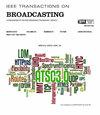A Sobolev Norm-Based Variational Approach to Companding for PAPR Reduction in OFDM Systems
IF 4.8
1区 计算机科学
Q2 ENGINEERING, ELECTRICAL & ELECTRONIC
引用次数: 0
Abstract
In this paper we present a new approach to high-performance compander design to reduce the peak-to-average power ratio (PAPR) that typically occurs in orthogonal frequency division multiplexing (OFDM) systems. Whereas many current compander designs assume a parametric model for the form of the transformed Rayleigh amplitude distribution, we define a constrained optimization problem for the functional form of the transformed distribution. We determine an optimal distribution which minimally deviates from the Rayleigh distribution and use a Sobolev norm to quantify distance. Use of the Sobolev norm imposes smoothness constraints on the transformed distribution, which are associated with lower out-of-band interference levels. We incorporate Lagrange multipliers into the problem formulation to enforce the constant power and probability density function constraints. We solve the constrained optimization problem using techniques from the Calculus of Variations and discuss compander and decompander design. We investigate the effect of incorporating derivative information, into the optimization formulation, on compander performance. We demonstrate compander performance through numerical simulation and compare compander performance to performance from a state-of-the-art variational compander which does not use derivative information in the formulation. We demonstrate performance improvements in out-of-band power rejection using the new compander.一种基于索波列夫规范的变分法,用于在 OFDM 系统中进行压缩以降低 PAPR
在本文中,我们提出了一种高性能复合器设计的新方法,以降低通常在正交频分复用(OFDM)系统中出现的峰均功率比(PAPR)。目前的许多合成器设计都假定变换后的瑞利振幅分布形式为参数模型,而我们则为变换后分布的函数形式定义了一个约束优化问题。我们确定了一个与瑞利分布偏差最小的最优分布,并使用索博廖夫规范对距离进行量化。Sobolev 准则的使用对变换后的分布施加了平滑性约束,这与较低的带外干扰水平有关。我们将拉格朗日乘法器纳入问题表述中,以强制执行恒定功率和概率密度函数约束。我们利用变分计算的技术解决了约束优化问题,并讨论了合成器和分解器的设计。我们研究了在优化公式中加入导数信息对合成器性能的影响。我们通过数值模拟展示了编译器的性能,并将编译器的性能与最先进的变分编译器的性能进行了比较,后者在公式中没有使用导数信息。我们展示了使用新的合成器在带外功率抑制方面的性能改进。
本文章由计算机程序翻译,如有差异,请以英文原文为准。
求助全文
约1分钟内获得全文
求助全文
来源期刊

IEEE Transactions on Broadcasting
工程技术-电信学
CiteScore
9.40
自引率
31.10%
发文量
79
审稿时长
6-12 weeks
期刊介绍:
The Society’s Field of Interest is “Devices, equipment, techniques and systems related to broadcast technology, including the production, distribution, transmission, and propagation aspects.” In addition to this formal FOI statement, which is used to provide guidance to the Publications Committee in the selection of content, the AdCom has further resolved that “broadcast systems includes all aspects of transmission, propagation, and reception.”
 求助内容:
求助内容: 应助结果提醒方式:
应助结果提醒方式:


